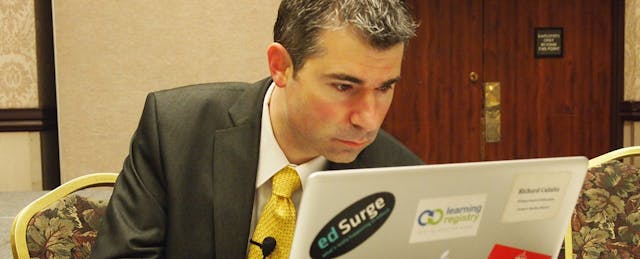For Richard Culatta, impatience is a virtue. That much is clear in the flurry of edtech initiatives undertaken during his time as Director of the Office of Educational Technology at the U.S. Department of Education.
“I’m not the most patient person in the world,” he admits. “We have kids’ futures at stake here and we don’t have the luxury of taking a long time.”
His time at the department, however, is drawing to a close. Culatta announced on Dec. 2 that he will step down from the post at the end of the year.
“This was a very hard decision” to make, he tells EdSurge. “I absolutely would not do it if we did not have a phenomenal team that would continue and accelerate the work.”
Culatta joined the education department in November 2011 as a deputy under Karen Cator, who was then director of the office. He assumed the role after she left in 2013 to lead the nonprofit, Digital Promise. Since then, his team has embarked on a wide range of education technology initiatives, from establishing a nationwide network of education leaders to hosting gaming and data “jams” for developers and designers.
Through Twitter chats, cross-country tours and even a MOOC, Culatta has steered efforts to bridge educators, entrepreneurs, researchers and other stakeholders to improve educational opportunities for all learners. “It’s part of the role of the Department of Education to bring people to the table who don’t often sit together,” he told EdSurge in June.
Perhaps the most important lessons he’s learned over the last three years, he says, is the “power of public-private relationships.”
One of the cornerstone projects he’s most proud of is “Future Ready,” a network of superintendents who regularly convene, access and share resources and lessons learned as they prepare their districts for digital learning. (Since its launch in November 2014, the Future Ready pledge has been signed by over 1,800 superintendents.) Culatta is also enthused about efforts to spur the creation and adoption of open educational resources. The department recently proposed a rule that would require any intellectual property created with Department of Education grants to be openly-licensed.
Underlying every technology initiative, however, is the need for Internet connectivity. At many events, Culatta underscored the importance of the ConnectED initiative, raising awareness around the need for better broadband and other tech infrastructure to support the use of online tools and services in schools.
Culatta’s team has also welcomed business and industry stakeholders. Efforts like the “Ed Tech Developer’s Guide,” a primer to help developers understand critical needs in education, are a recognition that “the problems that we’re dealing with are too complex for any one group to solve on their own.” Researchers will have to play a role, too, in creating tools that schools can use to quickly evaluate the efficacy of learning apps.
For a man who once wore the title of “Chief Impatience Officer” at a previous company, the one area he wishes to see more progress is teacher professional development. “Teacher prep is an area where we need to moving much faster,” Culatta says. “We need to help teachers learn to teach in a new reality of connected classrooms.”
Culatta’s next step will be working “at the state level” back home in Rhode Island, where he first dipped his toes in digital learning as an instructional technologist at the University of Rhode Island. He’s mum about his exact role or title, but it’s a safe bet that it’ll involve technology and data.
Culatta will leave a staff of 15 at the Office of Educational Technology. His successor has not been picked yet. Joseph South, currently deputy director of the office and next down on the pecking order, may be tapped to fill his shoes.


